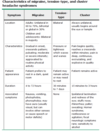Headaches (primary HAs)- MJ Flashcards
(49 cards)
- What age group are tension headaches MC in?
- MC in men or women?
- Mid teens to < 50 (uncommon > 50)
- M >W (3:2)
What are the 4 risk factors of tension-type headaches?
- Stress
- Fatigue
- Noise
- Glare
(“Some Noise Gives Father tension headaches”)
The following is the proposed etiology of which type of headache?
- Peripheral activation/sensitization of pericranial myofascial nociceptors
- Decrease nociceptor threshold
- Normally innocuous stimuli are misinterpreted as pain
- Prolonged nociceptive stimuli from pericranial myofascial tissues sensitizes pain pathways in the CNS
Tension type headache
The following are clinical findings of which type of headache?
- Daily/episodic HAs lasting from 30 minutes to 7 days
- Bilateral
- Pressing / tightening quality (non-pulsating)
•Mild or moderate intensity
- Photophobia / phonophobia are rare
- Not increase with activity
•No N/V
•May have increased tenderness of pericranial myofascial tissue
Tension headache
Does tension headache normally have N/V, photophobia and phonophobia? If not, what headache is this usually seen in?
- No N/V, photophobia/phonophobia are rare
- these are seen in migraines
What is acute 1st line tx for tension headaches?
- NSAIDS (Ibu, Naproxen)
- Acetaminophen
- Aspirin
*can combine w/ caffeine for increased effect*
What should you NOT use for acute tx of tension headaches?
- Opioids
- Butalbital (Fiorinal,Fioricet)
- Muscle relaxants
What are 5 non pharmacologic treatments for tension headaches?
- Biofeedback
- CBT
- Relaxation techniques
- Acupuncture
- PT
(“PT’s eat CARBs”)
What is the pharmacologic treatment for chronic tension headaches (>7-9 HAs/month)
- Tricyclic antidepressant (Amitriptyline or Nortriptyline)
- May reduce frequency and intensity of attacks
- Start with low dosage
What 2 other antidepressants can be used as treatment for chronic presentation of tension headaches (>7-9 HAs/month) if there is a contraindication for tricyclic antidepressants?
Mirtazapine
Venlafaxine
Which 2 anticonvulsants can be used as treatment for chronic presentation of tension headaches (>7-9 HAs/month)
Topiramate
Gabapentin
What are all of the pharmacologic treatment options for chronic presentaton of tension headaches ( >7-9 HAs/month)?
- Tricyclic antidepressants (ex: Amitriptyline, Nortriptyline)
- Other antidepressants (if tricyclic contraindicated)
- mirtazapine
- venlafaxine
- Anticonvulsants
- Topiramate
- Gabapentin
- Tizanidine
- Trigger point injections- Lidocaine
- Botox
Who are cluster headaches most common in? (gender, age)
Most common in:
- Men
- > 30y/o (peak in 40s)
Which type of headache is the least common primary headache disorder?
Cluster headaches
The following are risk factors for which type of headache?
- Genetics (1st degree relative= 14 fold increase)
- Cigarette smoking
- Prior head injury
- High alcohol consumption
- Type A personality
Cluster headache
The following is the pathophysiology behind which type of headache?
- Hypothalamic activation with secondary activation of the trigeminal-autonomic reflex
Cluster headache
The following are triggers of which type of headache?
- Alcohol
- Stress
- Glare
- Specific foods
- Disorder of circadian rhythm
- Sleep (reduced oxygenation)
- Sildenafil
- Volatile smells
- Vasodilators
- Smoking
Cluster headache
The following is the clinical presentation of which type of HA?
- HA 15-180min up to 8x/day
- unilateral (usually eye/temporal)
- pain peaks w/in 10-15 min
- Often at night (nighttime awakenings)
- Severe, piercing, boring, exploding, penetrating
- Individuals are agitated and restless
Cluster headache
What are the 2 forms of cluster headaches?
- Episodic (MC)- attack phases last 2-16wks followed by cluster free period of 6mo-years
- Chronic- No sustained cluster free episodes >1mo
Patients with cluster headache should have at least 1 of what 6 symptoms on the affected side?
(“My Cute Pet Louie Runs Noisily”)
- Conjunctival injection
- Lacrimation
- Nasal congestion
- Rhinorrhea
- Ptosis
- Miosis
(“My Cute Pet Louie Runs Noisily”)
What is the 1st line treatment for a patient with an acute episode of a cluster headache?
- **100% O2**
- Sumatriptan SC (contraindicated in CVD), or intranasal zolmitritptan
Other than 100% O2, that are the 4 other options for tx of an acute episode of cluster headache?
- Intranasal lidocaine
- Oral ergotamine
- IV dihydroergotamine
- Glucocorticoids (to help bridge)
When a patient presents with a cluster headache, you want to start treatment for the acute attack as well as preventative tx. What medication can you use to help bridge this?
Glucocorticoids



